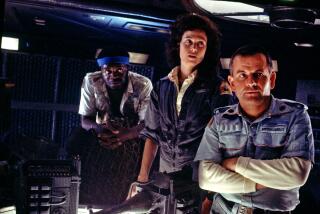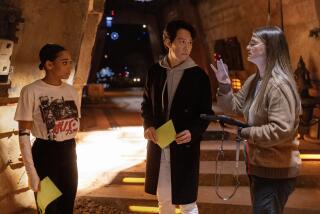‘Rogue One’ star and fan favorite Donnie Yen almost passed on the film
You’d think pretty much any actor alive who can do a halfway decent flying kick would jump at the chance to play a martial-arts-fighting, Force-sensitive monk in a “Star Wars” movie. But internationally known action star Donnie Yen initially resisted the idea of signing on to play Chirrut Îmwe in “Rogue One: A Star Wars Story.” To put it in Jedi terms, Chirrut was simply not the role he was looking for.
A key player in the Rebel mission to steal the Death Star plans, capable of single-handedly taking out a squadron of Stormtroopers with just a wooden staff and his trust in the Force, Chirrut has now become one of the major breakout characters in “Rogue One.” And it’s safe to say Yen is glad he came around.
We spoke to Yen, 53, earlier this month at the Lucasfilm headquarters in San Francisco about why he resisted joining “Rogue One,” how the deadly but deadpan character evolved and how his presence in the film could impact the box office in China.

Watch the trailer for “Rogue One: A Star Wars Story.”
How did you get involved in “Rogue One” to begin with?
Oh goodness, to be honest, it sounds crazy. My agent called me and he said, “Disney is looking for you and they want you to be in ‘Star Wars.’” At first I said, ‘OK, they probably want me to swing the light saber against Darth Vader or something.’ Then [director] Gareth [Edwards] called me and started telling me that there would be no Jedi in the movie and about this particular character.
It’s crazy but I was hesitant about taking this role. I was flattered but at the same time I didn’t want to leave my family for five months to go to London, because I just got off another movie.
I turned to my children and I said, “Do you like baba’s ‘Ip Man’ series?” — because I’m known to Western audiences for ‘Ip Man.’ “Or do you want baba to be in ‘Star Wars’?” They went, “‘Star Wars,’ of course!”
I said, ‘Wait a minute — there’s something special there.’ Then my friends and family and fanboys, everybody was so excited and I realized, this is not just making a movie. You’re making history here. So that’s how I got involved, and I’m so glad I did.
The original “Star Wars” trilogy wasn’t released in China at the time. Did you have any connection to the franchise growing up?
I spent some years living in Boston as a teenager, and I saw “A New Hope” and “Empire Strikes Back” there. But I’ve been in the business 35 years and I never expected to be in “Star Wars.” That never sunk in until in the middle of making the film: “I’m in ‘Star Wars’ — how cool is that!”
How did Gareth initially pitch his take on the movie and who Chirrut would be?
I asked him a very blunt, frank question: “Why do you want me to be in your film? The China market? The Asian market?” Because originally I thought, ‘Oh, they just want me to kick some Stormtrooper’s butt.’
And he said no, that he watches all my films and he wants a very specific persona in Chirrut by Donnie Yen. That was very flattering, and that was the answer I was looking for.
Then when I started reading the script, I realized that I get to say the coolest lines. Chirrut is not a Jedi but he has all the lines of “Star Wars” metaphor. You know, “May the Force be with you.” “I’m one with the Force and I fear nothing.”
I mean, what more can I want? People die to do this — and I have the coolest lines!
You’ve obviously done many martial-arts movies but have you ever had to do fight scenes in which you were supposed to be blind?
No, never. I thought that was really challenging. I underestimated that situation.
How Chirrut ended up being blind was a collaboration of me and Gareth. During the process, we were talking about different possibilities and he was asking my opinions. I said, “I want this character not to be so clichéd. I’ve played this character thousands of times — this type of bad-ass, skillful warrior hero. I want him to be grounded. I want him to be human, even vulnerable. Wouldn’t it be interesting to have him blind?”
He liked the idea, Disney loved it — and Chirrut ended up being blind.
The other thing that was very important to me is: “Listen, I know he’s a true believer and he’s constantly preaching his philosophies. But let’s make him like you and I: He has a sense of humor. He gets it. He can have a beer with you.”
Those are two things I’m glad this character ended up having.
How was it actually performing the fight scenes without really being able to see?
I’ve done choreography all my life and that, to me, was not a problem. But having the contact lenses and having to take them off every three hours and have a rest — and on top of that, every 30 seconds they have to put drops in my eyes. It was very irritating. It was very blurry. It was hard to judge distance. But that was OK because I’m supposed to be blind anyway.
I relied on my instincts and experience from many movies. That wasn’t the most difficult part. The most difficult part was not being able to interact with my fellow actors. I wasn’t able to look them in the eyes to inform the action. I didn’t want to look robotic — no offense to Alan [Tudyk, who plays droid K-2SO]. But at the same time, I had to have that kind of blank state of mind.
Over the summer, there were reports of extensive reshoots on “Rogue One,” and people were speculating about whether the film was in trouble and how much was being changed. How much was true and how much was just rumors?
This Internet today, you never know the whole story — and even if you do, there are so many angles of looking at the matter.
I’ve never done a movie that has no reshoots. The most important thing is that, at the end, you see a good movie. These are the processes. You have to filter the materials — that’s the artistic process.
The greatest painter — he’s not going to get it the first time. He’ll do a couple of brush strokes here, a couple of brush strokes here.
The “Star Wars” franchise still isn’t as deeply established in China as it is in other parts of the world. You said you didn’t want to be cast simply to help boost the Asian box office. But have you gotten any sense that audiences in China are more excited about “Rogue One” because you’re in it?
I would like to think so [laughs]. After all, the film business is business. It’s supply and demand, right? China is the biggest audience in the world. If I’m a producer, I would put Chinese actors like myself in a film — it just makes sense. It’s the right thing to do.
Also, I think morally, the world we live in today should be this way. It should be diverse and in peace and unity to make a better place.
Twitter: @joshrottenberg
ALSO
Everything you need to know about ‘Rogue One’s’ new ‘Star Wars’ space cape
Big flops. Waning studio profits. What Hollywood’s record box office doesn’t tell you
More to Read
Only good movies
Get the Indie Focus newsletter, Mark Olsen's weekly guide to the world of cinema.
You may occasionally receive promotional content from the Los Angeles Times.











